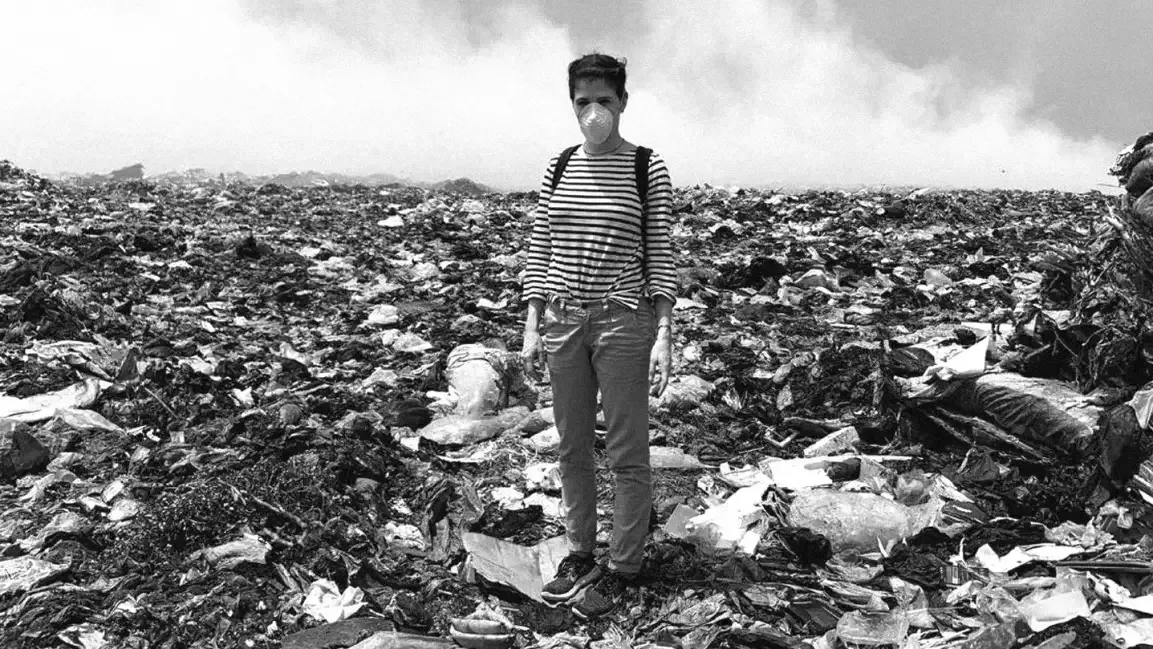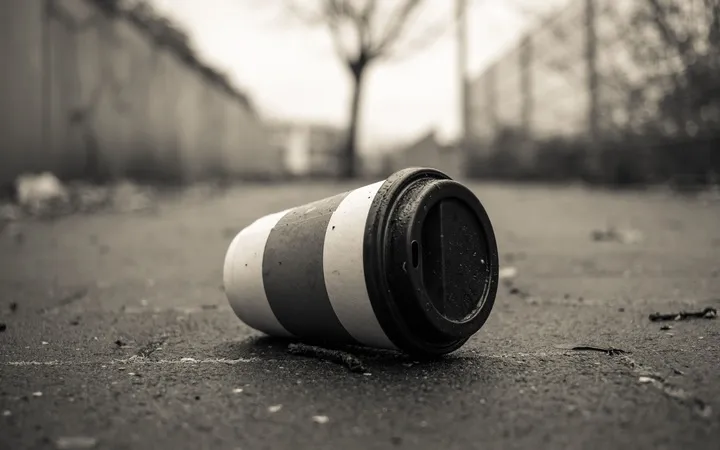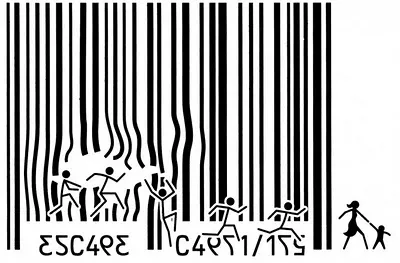In Ghana, market stall owners open up big bales of dead man's white clothes, recycling donations from the west to sell at huge West African markets - some 4 million tonnes in a trade estimated to be worth $4.6 billion. Twenty years ago, traders could bank on unseen bales to make a profit - but now, a vast amount of each bale are stained, torn, and basically unusable, ending up in landfill. According to the above linked article, we're buying over twice the amount of clothes we did twenty years ago, but keeping them for half as long - new clothes become old within two or three wears, either from fast changing fashions or simply because they're very cheaply produced.
An estimated 85 per cent of all textiles go to the dump every year, according to the World Economic Forum, enough to fill Sydney Harbour annually. Globally, that’s the equivalent of one garbage truck of textiles being burned or going into landfill every second.1
Cheap clothes can be so cheap that they don't even make it to charity shops as they become very quickly unwearable. Waste is the business model of fashion. Whilst we shop online for the latest bargain, huge rubbish dumps of textiles catch alight in places like Ghana where thousands of people make their home out of necessity. And if they're not catching alight, they're taking hundreds of years to decompose.

Have you thought about where your old clothes go to die?
But still we buy fast fashion. I've sure as hell been guilty of it - that cute little cheap top that I bought off the internet that lasted all of a month before it started to fray.
And we buy takeaway coffees, even if we know we shouldn't. We're told that the plastic membrane inside of a coffee cup can take 30 years to decompose and even the biodegradable ones end up in landfill and become part of the problem - daily, two million coffee cups end up there. And even the 'keep cup' industry isn't squeaky clean. As a nano influencer on Instagram (having nearly 4k followers) I often get asked if I'd like to buy a product at a discount and model it on my feed (which I never do). More than once it's been about re-usable coffee cups. The conversation goes a little like this:
'I already have one'
'Oh, but did you know that ours come in five different colours?'
'Yes, but I already have one!'
'We can ship you one for free!'
'What, from America?'
'Yes, we are trying to save the planet'
'What, by shipping me a keep cup from the other side of the world on an aeroplane, that I don't need, to model for people who already have keep cups?'
'We're just trying to do our bit for the environment'
'But I already have one'
And I do - one I hope I'll never lose. Even a keep cup takes at least twenty uses before it pays for itself environmentally, and what happens to the ones we grow tired of because we've found a supposedly better one? I don't want to go as far as environmental activist Sarah Wilson who uses a jam jar wrapped in rubber bands from vegetable produce, but I sure as hell am not switching my keep cup on a whim.

My local cafe has introduced a 'latte levy' where it's more expensive to buy a coffee in a takeway cup than a reusable one. But is it enough?
Because buying things on a whim is what's wrong with us. The dopamine hit from shopping has an enormous environmental impact, and the cognitive dissonance that drives capitalism is astounding: we seem to know that what we are doing is wrong at the exact time we're reaching for our credit card. Greenwashed, we buy 'eco' products with no real understanding about where they end up or even the manufacturing that has gone in to them. Think Nespresso pods - they can go to special recycling centres but often simply end up in landfill, let alone the energy that has gone into producing, packaging and distributing them. What happened to the simple way in which we used to brew coffee? Why do we fall for the allure of marketing that promises convenience?
Sadly, we seem to live in a world (and I'm talking the west, here, because that's where I live) where we work hard to spend money on things we don't need, with little care of where things end up.
What if we just stopped?
How do we raise our children to live consciously, to be aware of how they are being manipulated to buy in to a world of products that they don't need to be happy people?
How do we stop tuning into our whims and fancies and instead leant in to a more minimalist, real and raw life where everything we consumed was something we thought about deeply before consuming it?
What if we spent less, and lived more? Less time working to buy the things we don't need and more time enjoying what we have. Less time at the shops, more time in nature. Less time destroying the very place we profess to love.
Is it really that hard? Do we care that little? I don't believe we do. This paper found that Australians in 2021 are three times more likely to be anxious about climate change than COVID. And the popular narrative is that it's the pandemic that's affecting mental health!
The only thing we can do is to act. Everything we do matters - even if we think it doesn't. Changing our lightbulbs or buying zero waste matters - there's a whole heap of personal actions that have ripple affects, even if they sound trite and insignificant. Taking responsibility for our actions means we enrich and strengthen our commitment to sustainability. It helps lay the foundation for the world we want to live in. But we also need to advocate for change - fight against the banks, the mining companies, the developers, the product lines that have no accountability for the mess they leave behind. We need to agitate and organise as much as we need to repurpose and reuse or boycott. It's the tension between political change and personal action where the magic happens.
Take meat eating, for example - becoming a vegetarian might not make much of a difference individually. Nor might vowing to have meat free Mondays or stopping eat meat every second day. But if you did this and raised awareness and got involved with groups that advocate for growing vegetables in back gardens or buying local, ethically raised and sustainable meat, well, then you're changing culture. And cultural change can rock the existing agriculture systems.

Have you ever vowed to buy nothing - for a day, a week, a month, a year?
Perhaps even eating meat isn't a good example, given the vehemency with which veganism is met. Let's try the 'Buy Nothing' movement - ideally diverse and inclusive community groups that partake in a gift economy and connect communities together because they encourage face to face interactions and conversations based on trust and generosity. Gift economies are extraordinary counter economies that defy capitalist models that somehow became oiled with greed and divided people into haves and have nots. I know first hand how liberating groups like this can be - as founder of a community gardening group who meets once a month to swap produce, seeds, knowledge and smiles, it's life changing. No longer are we dependent on big retailers for buying seedlings come Spring, but we're encouraging and supporting people to get involved and growing their own, in gifting and swapping seedlings rather than driving 45 kilometres up the highway to buy them. It's provided an antidote to loneliness for many, who simply come to chat and feel included. It's these kind of alternative economies that start to shift people's relationship with money and reconfigure their ideas about abundance, and that's all without big political invention.
This post was meant to be short and sweet, but I seem to have so much to say about it. Like millions of others, eco anxiety gnaws at me, and keeps me up at night. It's easy to feel despair, to give up, to resign oneself for the end of the world as we know it. But we need to step away from fear into positive actions that ripple out into this beautiful world of ours.
Are you with me?
This post is written in response to the Natural Medicine and Holos Lotus 'Healing for Mother Earth' challenge in response to climate change. Check the conditions for each before you post in each community, but do get involved by writing your thoughts about what we can do, or what we personally DO do, to heal the earth and do what we can to avert the very real crisis we are all facing together. For the Natural Medicine challenge, you can post as many times as you like - thank goodness, as I have more to say!
With Love,

Are you on HIVE yet? Earn for writing! Referral link for FREE account here

